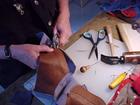|
Prior to the Late 1800's work
was done in the home, on the farm, or in the local shop of the
Master Craftsman.
With the rapid growth of Mass
Production in the early 1900's, the movement was to centralized
manufacturing and distribution facilities. Small local factories
were closed. People were forced to travel long distances to find
work, often leaving their home, family and friends behind.
During the Mid 1900's the Global
Economy became an important factor in Mass Production and consumer
oriented product development for Mass Marketing.
Some nations became Consumers,
and others Producers. Driven by Price Competition, manufacturers
would go to the ends of the earth to find the cheapest possible
labor to produce their products.
By the Late 1900's almost 98%
of the footwear that was being sold in the US was produced in
a foreign country. The competition for cheap prices was eventually
realized in the poor quality of the finished products.
The items would "Look Great",
but they would soon fall apart, and in most cases the products
are not repairable, forcing the consumer to purchase another
item and send the old one to the land fill.
In the long run this type of
thinking has proven to be very costly, and short sighted. |
 |
Since the 1990's many people
have been displaced from their career positions, and smaller
businesses have been forced to close down completely due to price
competition from cheap foreign imports.
By the turn of the Century in
2000, Consumers have grown weary from the cheap quality of the
mass produced import goods that are forced on them. They are
searching for alternatives at a time when there are very few
choices for quality locally produced footwear.
In the 21st Century we will have
come full circle, bringing Old World Craftsmanship together with
Modern Technology to develop the Cottage Industry of the Future.
Localized manufacturing and marketing
makes it possible to offer customized, high quality products
and services to the local community, stimulating the local economy.
Historically, at times when money
is tight, bartering for products and services has always been
a reliable method of stimulating the local economy and creating
Self Employment, which often grows into a Home Based Business
or Cottage Industry.
Traditionally, Shoemakers have
been Self Employed, independent personalities.
The most successful shoe companies
in the world were founded by the Master Craftsman Shoemaker. |



